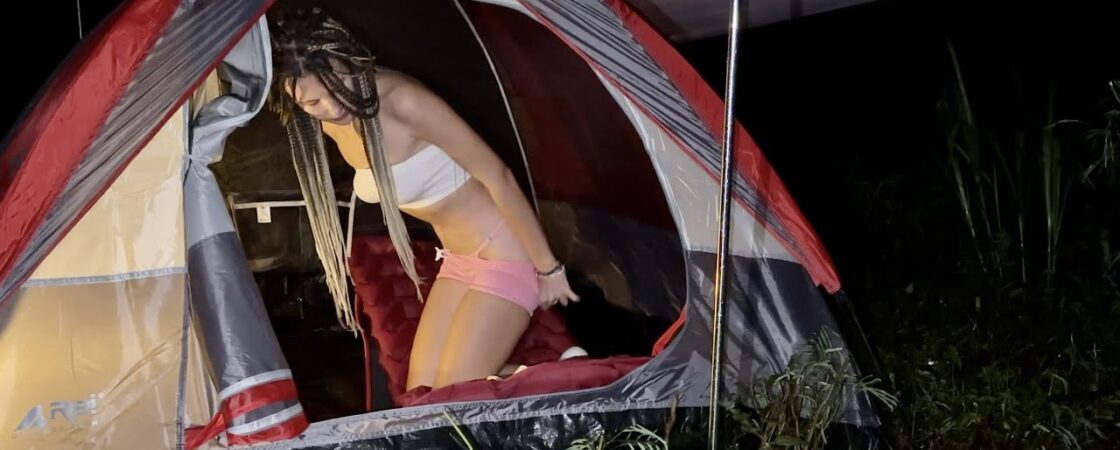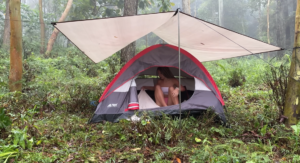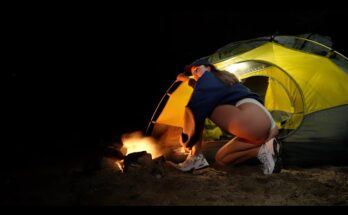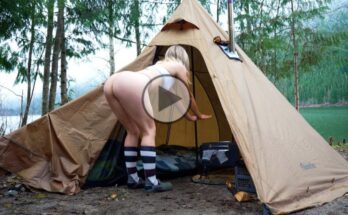SOLO OVERNIGHT CAMPING IN THE RAIN – RELAXING IN THE TENT WITH THE SOUND OF NATURE
Solo overnight camping in the rain can be a deeply relaxing and rewarding experience, provided you are well-prepared and take appropriate precautions. Below is a detailed breakdown of what to expect, how to prepare, and how to make the most of this unique outdoor adventure.
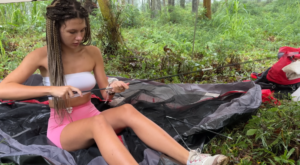
1. Benefits of Solo Camping in the Rain
Camping alone in the rain offers several benefits that enhance both mental well-being and your connection with nature:
-
Relaxation: The sound of rain hitting the tent creates a natural white noise that can help reduce stress and promote relaxation.
-
Connection with Nature: Rain amplifies the sounds of nature, such as rustling leaves, flowing streams, or distant animal calls, creating an immersive experience.
-
Privacy and Solitude: Fewer people tend to camp during rainy weather, allowing for a more secluded and peaceful environment.
-
Mindfulness Opportunity: Being alone in nature encourages mindfulness as you focus on your surroundings without distractions.
2. Essential Gear for Camping in the Rain
Proper gear is crucial to ensure safety and comfort during rainy conditions. Here’s what you need:
Tent
-
Choose a high-quality waterproof tent with a durable rainfly that extends over the sides of the tent.
-
Ensure the tent has sealed seams and a bathtub-style floor (a raised edge at the bottom) to prevent water from seeping in.
-
A footprint or ground tarp placed under your tent adds an extra layer of protection against moisture.
Sleeping Gear
-
Use a sleeping bag rated for the expected temperature range; synthetic insulation is preferable since it retains warmth even when damp.
-
A sleeping pad provides insulation from cold, wet ground.
Clothing
-
Pack moisture-wicking base layers, waterproof outerwear (jacket and pants), and insulated layers for warmth.
-
Avoid cotton clothing as it retains moisture; opt for wool or synthetic materials instead.
-
Bring extra socks and gloves to keep extremities dry.
Footwear
-
Waterproof hiking boots are essential for navigating wet terrain safely.
-
Gaiters can help keep water out of your boots when walking through puddles or tall wet grass.
Other Essentials
-
A reliable headlamp or flashlight with extra batteries (rainy weather often means reduced visibility).
-
Dry bags or waterproof stuff sacks to protect electronics, food, and clothing from getting wet.
-
A lightweight tarp or canopy for creating a dry cooking area outside your tent.
3. Setting Up Camp in Wet Conditions
-
Choose Your Campsite Wisely:
-
Look for higher ground to avoid pooling water.
-
Avoid setting up near rivers or streams that could rise unexpectedly due to heavy rainfall.
-
Check above for dead branches (“widowmakers”) that could fall during storms.
-
-
Pitch Your Tent Correctly:
-
Lay down your footprint or tarp first but ensure it doesn’t extend beyond the edges of your tent (to prevent water collection).
-
Secure all guylines tightly so rainwater runs off rather than pooling on top of your tent.
-
-
Create a Dry Zone:
-
Set up a tarp over your cooking area using trees or trekking poles. This allows you to cook safely without being exposed directly to rain.
-
4. Staying Comfortable Inside Your Tent
Once inside your tent during rainfall, there are several ways to stay comfortable while enjoying the soothing ambiance:
-
Keep Wet Gear Separate:
-
Store wet clothes and shoes in a vestibule or separate dry bag outside your sleeping area.
-
-
Stay Warm:
-
Change into dry clothes immediately after entering your tent.
-
Use hand warmers if necessary to maintain body heat.
-
-
Entertainment:
-
Bring books, download music/podcasts ahead of time, or simply enjoy journaling while listening to nature’s sounds.
-
-
Food Preparation:
-
If safe (and allowed), use a small backpacking stove inside the vestibule area under proper ventilation for warm meals or drinks like tea/hot chocolate.
-
5. Safety Considerations While Camping Alone in Rainy Weather
Safety should always be prioritized when camping solo in potentially challenging conditions:
-
Inform someone about your plans before heading out—include details about where you’ll be camping and when you plan to return.
-
Monitor weather forecasts closely before leaving; avoid areas prone to flash flooding if heavy rains are predicted.
-
Carry emergency supplies such as a first-aid kit, whistle, multi-tool/knife, fire-starting materials (e.g., waterproof matches), and an emergency blanket.
6. Mental Health Benefits of Listening to Rainfall Sounds
The sound of rainfall has been scientifically shown to have calming effects on the brain by promoting alpha wave activity associated with relaxation states:
-
It masks disruptive noises like traffic or other human-made sounds that might otherwise disturb sleep patterns outdoors.
-
The rhythmic pattern of raindrops triggers ASMR-like sensations (Autonomous Sensory Meridian Response) which many people find soothing.
